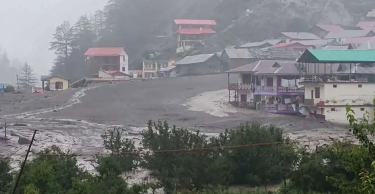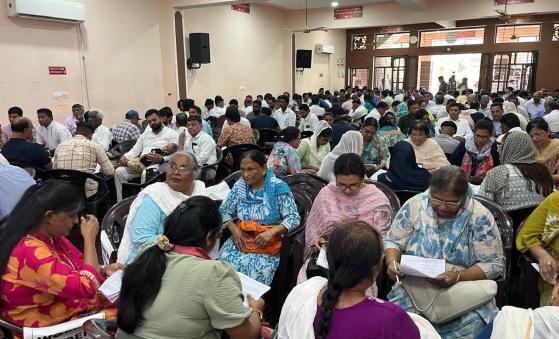
A powerful flash flood swept through a mountain town in northern India on 5 August, killing at least four people and leaving around 100 others missing.
The flood, caused by a sudden cloudburst, sent a surge of mud and water crashing into Dharali, a town in Uttarakhand state. Buildings were destroyed as the fast-moving water tore through the narrow mountain valley.
Government officials have called the situation “serious.” India’s Minister of State for Defence, Sanjay Seth, said: “We have received reports of four confirmed deaths and around 100 people unaccounted for. We are praying for their safety.”
Dramatic footage shown by Indian media captured the moment muddy water swept away multi-storey buildings. Some residents could be seen fleeing before being swallowed by the flood.
Rescue teams have been sent urgently to the area. Uttarakhand’s Chief Minister Pushkar Singh Dhami said efforts are underway "on a war footing" to search for survivors and provide aid.
The Indian Army reported that 150 soldiers had arrived in the town and rescued about 20 people. Photos taken after the main flood show streets filled with thick mud. In some places, the mud is up to 15 metres deep, covering buildings almost entirely.
“All available resources are being used to search for and rescue those still trapped,” said army spokesman Suneel Bartwal.
Prime Minister Narendra Modi expressed his sorrow over the loss of life and promised full support for the ongoing rescue work.
Meteorological officials issued a red alert for the region, reporting that some areas had received up to 21 centimetres of rain in a short time. This level of rainfall is considered "extremely heavy."
Floods and landslides are common in India during the monsoon season, which lasts from June to September. However, experts warn that climate change and unplanned construction are making these disasters worse.
The World Meteorological Organization has called extreme weather events like this a warning sign of how the global water cycle is being disrupted.
Climate campaigner Harjeet Singh from the Satat Sampada Climate Foundation said: “This disaster is a deadly mix. Climate change is bringing heavier rains, and our actions, like cutting down hills and building unsafely, are removing our natural protection.”
As communities mourn and rescue operations continue, there are renewed calls for better planning, climate action, and stronger protection for vulnerable mountain regions.
As rescue efforts continue and the people of Uttarakhand face the difficult days ahead, churches and believers across India and beyond are being encouraged to stand in prayer and solidarity. In times of loss and uncertainty, may the hope and comfort of Christ bring peace to those who grieve, and may wisdom guide those responding to the crisis. Such moments remind us of the urgent need to care not only for our neighbours, but also for God's creation, entrusted to us with love and responsibility.




